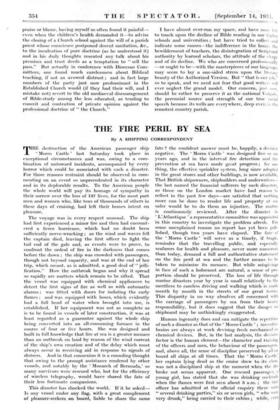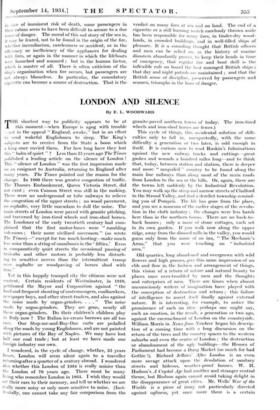THE FIRE PERIL BY SEA
By A SHIPPING CORRESPONDENT THE destruction of the American passenger ship ' Morro Castle' last Saturday took place in exceptional circumstances and was, owing to a com- bination of untoward incidents, accompanied• by every horror which could be associated with such a disaster. For those reasons restraint should be observed in com- menting on an event so unprecedented in its character and in -its deplorable results. To the American people the whole world will pay its homage of sympathy in their sorrow over the loss of 187 lives, for the most part men and women who, like tens of thousands of others in these days of cruising, had left their homes intent on pleasure.
The voyage was in every respect unusual. The ship had first experienced a minor fire and then had encount- ered a fierce hurricane, which had no doubt been sufficiently nerve-wracking ; as the wind and waves fell the captain died, leaving the first officer to fight the tail end of the gale and, as events were -to prove, to confront the ordeal of fire in the darkness that comes before the dawn ; the ship was crowded with passengers, though not beyond capacity, and was at the end of her trip, which meant, as is admitted, a good deal of " jolli- fication." How the outbreak began and why it spread so rapidly are matters which remain to be sifted. That the vessel was equipped with chemical appliances to detect the first signs of fire as well as with automatic alarms ; was fitted with doors for isolating the early flames ; and was equipped with hoses, which evidently had a full head of water when brought into use, is established. If her equipment was not as complete as is to be found in vessels of later construction, it was at least regarded as a guarantee against the whole ship being converted into an all-consuming furnace in the course of four or five hours. She was designed and built in full knowledge that fire at sea is a greater menace than an outbreak on land by reason of the wind current of the ship's own creation and of the delay which must always occur in receiving aid in response to signals of distress. And-in that connexion it is a consoling thought that owing to the prompt assistance rendered by other vessels, and notably by the ' Monarch of Bermuda,' so many survivors were-rescued who, but for the efficiency of wireless telegraphy, would haVe shared the fate of their less fortunate companions.
This disaster has shocked the world. If it be asked— Is any vessel under any flag, with a great complement of pleasure-seekers on board, liable to share the same fate ? the confident answer must be, happily, a decisive negative. The ' Morro Castle' was designed five or six years ago, and in the interval fire detection and fire prevention at sea have made great progress ; for one - thing, the effective sprinkler system, long since adopted in the great stores and other buildings, is now available. That British shipowners, shipbuilders and underwriters— the last named the financial sufferers by such disasters, as those on the London market have • had reason to reflect in the past .few days—are satisfied that nothing more can be done to render life and property at sea safer would be to do them an injustice. The matter is continuously reviewed. After the disaster to L'Atlantique ' a representative committee was appointed in this country to investigate the problem afresh. For some unexplained reason no report has yet been pub- lished, though two years have elapsed. The fate of the ' Morro Castle ' will serve as a timely, if tragic, reminder that the travelling public, and especially seafarers for health and pleasure, never more numerous than today, demand a full and authoritative statement on the fire peril at sea and the further means to be taken to minimize its menace. But while misgivings in face of such a holocaust are natural, a sense of pro- portion should be preserved. The loss of life through marine disasters year by year is small relatively to the sacrifices to careless driving and walking which is made month by month in the streets • of our great towns. This disparity in no way absolves all concerned with the carriage of passengers by sea from their heavy responsibility, but it does suggest that the danger on shipboard may be unthinkingly exaggerated.
Human ingenuity does and can mitigate the repetition of such a disaster as that of the ' Morro Castle ' ; inventive brains are always at work devising fresh mechanical or chemical devices. But; in the last analysis, the decisive factor is the human element—the character and training of the officers and men, the behaviour of the passengers, and, above all, the sense of discipline preserved by all on board all ships at' all times. That the ' Morro Castle,' her captain lying dead as the cruise drew -to: its close, was not 'a disciplined ship at the -moment When. the fire broke out seems 'apparent. One rescued 'passenger, a young girl, has stated that she was drinking' cocktails when the flames were first seen about 8 a.m.-; the first officer has admitted at the official enquiry there were " several drinking parties," six or seven girls, " who were very drunk," being carried to their cabins ; while, even in Mee of imminent risk of death, some passengers in their cabins seem to have been difficult to arouse to a due sense of danger. The moral of this sad story of the sea is, it may be feared, not to be found in the origin of the fire, whether incendiarism, carelessness or accident, or in the efficiency- or inefficiency of the appliances for dealing with fires, or again in the manner in which the lifeboats were launched and manned ; but in the human factor, which is master of all. There is often criticism of the ship's organization when fire occurs, but passengers are not always blameless. In particular, the consolatory cigarette can become a source of destruction. That is the verdict on many fires at sea and on land. The end of a cigarette or a still burning match carelessly thrown aside has been responsible for many fires, in tinder-dry wood- lands, in crowded buildings, and in well-filled ships of pleasure. It is a consoling thought that British officers and men can be relied on, as the history of marine disasters abundantly proves, to keep their heads in time of emergency, that regular lire and boat drill is the inflexible rule on board the best managed British ships ; that day and night patrols are maintained ; and that the British sense of discipline, preserved by passengers and seamen, triumphs in the hour of danger.











































 Previous page
Previous page